
Published :
Updated :

The 'A-Challan' or automated challan system, introduced under the strengthening public financial management programme, has revolutionised resource mobilisation for the government exchequer.
In less than one year spanning from July 2022 to May 2023, an impressive total of Tk 1.058 trillion, equivalent to around one-third of the total revenue, was successfully collected through 'A-Challan', according to the finance ministry.
Launched in 2019, this automated mechanism has swiftly become the most efficient tool for collecting funds from the public.
Under this system, citizens and companies can deposit funds for treasury challans at any branch of commercial banks or through online banking and mobile financial system.
People familiar with the matter told the FE that the previous manual system of revenue collection caused significant delays, directly impacting the government exchequer.
Only Bangladesh Bank and Sonali Bank were authorised to collect government revenues through the conventional treasury challan system, which covered key public services such as income tax, VAT, customs and excise duties, passport fees, visa and NID fees, and land registration fees.
This system required clients to deposit cash in person, leading to long queues and potential challenges, including missing challans and discrepancies with banks.
Besides, funds would often remain idle in different banks and departments.
However, with the new system in place, the government is now receiving daily resources of Tk 5.0 billion to Tk 7.0 billion, significantly improving the speed of revenue collection, according to a senior Finance Division official.
He said they even had to borrow funds due to the revenue delays under the conventional system.
According to the official, the government has significantly reduced the commission given to banks for handling charges, resulting in reduced government expenditure.
"In the nine months ending March of the current fiscal year, we spent Tk 660 million-plus as commission to the banks for collecting the fees and other government revenues."
He said that the commission previously given to banks was nearly double the amount. The current bank commission rate for collecting the charges is 0.10 per cent, which was previously set at 0.20 per cent.
The official mentioned that the collection process faced challenges due to the involvement of multiple institutions, including the Bangladesh Bank and the office of the Controller General of Accounts (CGA).
He said the scope of depositing government fees and resources has now been expanded.
In the past, only nine branches of the central bank and around 731 branches of state-owned Sonali Bank collected such government fees and resources.
Currently, individuals can deposit resources through all commercial banks, including central bank branches, and even through mobile financial systems like bKash and Rocket.
The 'A challan' system covers 138 out of 196 economic codes, with plans to include the remaining codes in the system soon, according to the Finance Division. The government collected Tk 11.03 billion in 2020-21, Tk 481.48 billion in 2021-22, and now has collected over Tk 1.058 trillion through the automated system.
jasimharoon@yahoo.com


 For all latest news, follow The Financial Express Google News channel.
For all latest news, follow The Financial Express Google News channel.